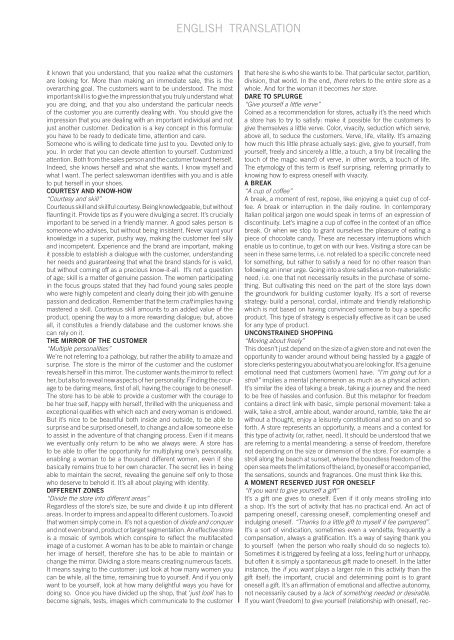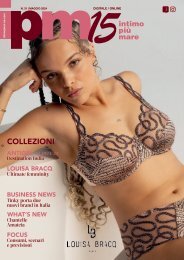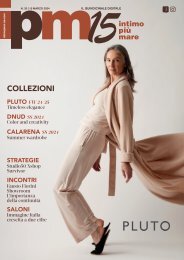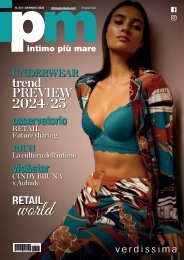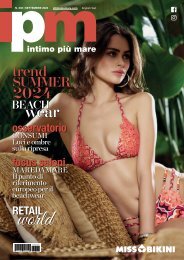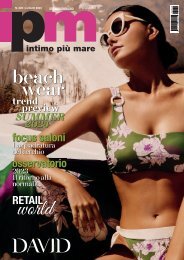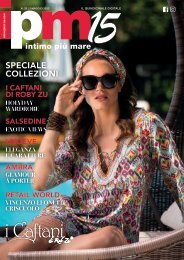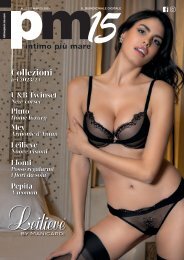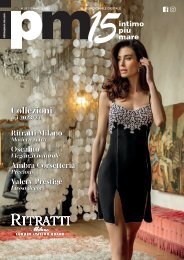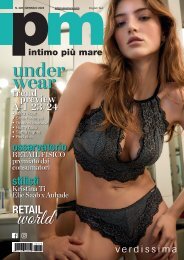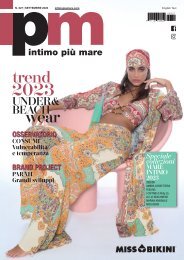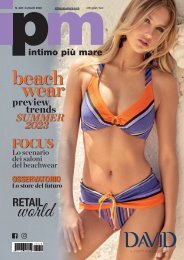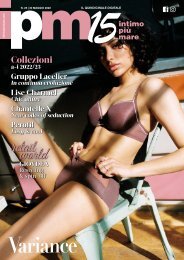Create successful ePaper yourself
Turn your PDF publications into a flip-book with our unique Google optimized e-Paper software.
ENGLISH TRANSLATION<br />
it known that you understand, that you realize what the customers<br />
are looking for. More than making an immediate sale, this is the<br />
overarching goal. The customers want to be understood. The most<br />
important skill is to give the impression that you truly understand what<br />
you are doing, and that you also understand the particular needs<br />
of the customer you are currently dealing with. You should give the<br />
impression that you are dealing with an important individual and not<br />
just another customer. Dedication is a key concept in this formula:<br />
you have to be ready to dedicate time, attention and care.<br />
Someone who is willing to dedicate time just to you. Devoted only to<br />
you. In order that you can devote attention to yourself. Customized<br />
attention. Both from the sales person and the customer toward herself.<br />
Indeed, she knows herself and what she wants. I know myself and<br />
what I want. The perfect saleswoman identifies with you and is able<br />
to put herself in your shoes.<br />
COURTESY AND KNOW-HOW<br />
“Courtesy and skill”<br />
Courteous skill and skillful courtesy. Being knowledgeable, but without<br />
flaunting it. Provide tips as if you were divulging a secret. It’s crucially<br />
important to be served in a friendly manner. A good sales person is<br />
someone who advises, but without being insistent. Never vaunt your<br />
knowledge in a superior, pushy way, making the customer feel silly<br />
and incompetent. Experience and the brand are important, making<br />
it possible to establish a dialogue with the customer, understanding<br />
her needs and guaranteeing that what the brand stands for is valid,<br />
but without coming off as a precious know-it-all. It’s not a question<br />
of age; skill is a matter of genuine passion. The women participating<br />
in the focus groups stated that they had found young sales people<br />
who were highly competent and clearly doing their job with genuine<br />
passion and dedication. Remember that the term craft implies having<br />
mastered a skill. Courteous skill amounts to an added value of the<br />
product, opening the way to a more rewarding dialogue; but, above<br />
all, it constitutes a friendly database and the customer knows she<br />
can rely on it.<br />
THE MIRROR OF THE CUSTOMER<br />
“Multiple personalities”<br />
We’re not referring to a pathology, but rather the ability to amaze and<br />
surprise. The store is the mirror of the customer and the customer<br />
reveals herself in this mirror. The customer wants the mirror to reflect<br />
her, but also to reveal new aspects of her personality. Finding the courage<br />
to be daring means, first of all, having the courage to be oneself.<br />
The store has to be able to provide a customer with the courage to<br />
be her true self, happy with herself, thrilled with the uniqueness and<br />
exceptional qualities with which each and every woman is endowed.<br />
But it’s nice to be beautiful both inside and outside, to be able to<br />
surprise and be surprised oneself, to change and allow someone else<br />
to assist in the adventure of that changing process. Even if it means<br />
we eventually only return to be who we always were. A store has<br />
to be able to offer the opportunity for multiplying one’s personality,<br />
enabling a woman to be a thousand different women, even if she<br />
basically remains true to her own character. The secret lies in being<br />
able to maintain the secret, revealing the genuine self only to those<br />
who deserve to behold it. It’s all about playing with identity.<br />
DIFFERENT ZONES<br />
“Divide the store into different areas”<br />
Regardless of the store’s size, be sure and divide it up into different<br />
areas. In order to impress and appeal to different customers. To avoid<br />
that women simply come in. It’s not a question of divide and conquer<br />
and not even brand, product or target segmentation. An effective store<br />
is a mosaic of symbols which conspire to reflect the multifaceted<br />
image of a customer. A woman has to be able to maintain or change<br />
her image of herself, therefore she has to be able to maintain or<br />
change the mirror. Dividing a store means creating numerous facets.<br />
It means saying to the customer: just look at how many women you<br />
can be while, all the time, remaining true to yourself. And if you only<br />
want to be yourself, look at how many delightful ways you have for<br />
doing so. Once you have divided up the shop, that ‘just look’ has to<br />
become signals, tests, images which communicate to the customer<br />
that here she is who she wants to be. That particular sector, partition,<br />
division, that world. In the end, there refers to the entire store as a<br />
whole. And for the woman it becomes her store.<br />
DARE TO SPLURGE<br />
“Give yourself a little verve”<br />
Coined as a recommendation for stores, actually it’s the need which<br />
a store has to try to satisfy: make it possible for the customers to<br />
give themselves a little verve. Color, vivacity, seduction which serve,<br />
above all, to seduce the customers. Verve, life, vitality. It’s amazing<br />
how much this little phrase actually says: give, give to yourself, from<br />
yourself, freely and sincerely a little, a touch, a tiny bit (recalling the<br />
touch of the magic wand) of verve, in other words, a touch of life.<br />
The etymology of this term is itself surprising, referring primarily to<br />
knowing how to express oneself with vivacity.<br />
A BREAK<br />
“A cup of coffee”<br />
A break, a moment of rest, repose, like enjoying a quiet cup of coffee.<br />
A break or interruption in the daily routine. In contemporary<br />
Italian political jargon one would speak in terms of an expression of<br />
discontinuity. Let’s imagine a cup of coffee in the context of an office<br />
break. Or when we stop to grant ourselves the pleasure of eating a<br />
piece of chocolate candy. These are necessary interruptions which<br />
enable us to continue, to get on with our lives. Visiting a store can be<br />
seen in these same terms, i.e. not related to a specific concrete need<br />
for something, but rather to satisfy a need for no other reason than<br />
following an inner urge. Going into a store satisfies a non-materialistic<br />
need, i.e. one that not necessarily results in the purchase of something.<br />
But cultivating this need on the part of the store lays down<br />
the groundwork for building customer loyalty. It’s a sort of reverse<br />
strategy: build a personal, cordial, intimate and friendly relationship<br />
which is not based on having convinced someone to buy a specific<br />
product. This type of strategy is especially effective as it can be used<br />
for any type of product.<br />
UNCONSTRAINED SHOPPING<br />
“Moving about freely”<br />
This doesn’t just depend on the size of a given store and not even the<br />
opportunity to wander around without being hassled by a gaggle of<br />
store clerks pestering you about what you are looking for. It’s a genuine<br />
emotional need that customers (women) have. “I’m going out for a<br />
stroll” implies a mental phenomenon as much as a physical action.<br />
It’s similar the idea of taking a break, taking a journey and the need<br />
to be free of hassles and confusion. But this metaphor for freedom<br />
contains a direct link with basic, simple personal movement: take a<br />
walk, take a stroll, amble about, wander around, ramble, take the air<br />
without a thought, enjoy a leisurely constitutional and so on and so<br />
forth. A store represents an opportunity, a means and a context for<br />
this type of activity (or, rather, need). It should be understood that we<br />
are referring to a mental meandering: a sense of freedom, therefore<br />
not depending on the size or dimension of the store. For example: a<br />
stroll along the beach at sunset, where the boundless freedom of the<br />
open sea meets the limitations of the land, by oneself or accompanied,<br />
the sensations, sounds and fragrances. One must think like this.<br />
A MOMENT RESERVED JUST FOR ONESELF<br />
“If you want to give yourself a gift”<br />
It’s a gift one gives to oneself. Even if it only means strolling into<br />
a shop. It’s the sort of activity that has no practical end. An act of<br />
pampering oneself, caressing oneself, complementing oneself and<br />
indulging oneself. “Thanks to a little gift to myself if fee pampered”.<br />
It’s a sort of vindication, sometimes even a vendetta, frequently a<br />
compensation, always a gratification. It’s a way of saying thank you<br />
to yourself (when the person who really should do so neglects to).<br />
Sometimes it is triggered by feeling at a loss, feeling hurt or unhappy,<br />
but often it is simply a spontaneous gift made to oneself. In the latter<br />
instance, the if you want plays a larger role in this activity than the<br />
gift itself; the important, crucial and determining point is to grant<br />
oneself a gift. It’s an affirmation of emotional and affective autonomy,<br />
not necessarily caused by a lack of something needed or desirable.<br />
If you want (freedom) to give yourself (relationship with oneself, rec-


